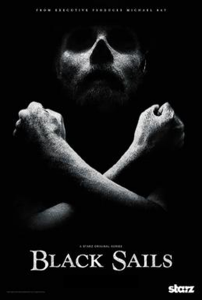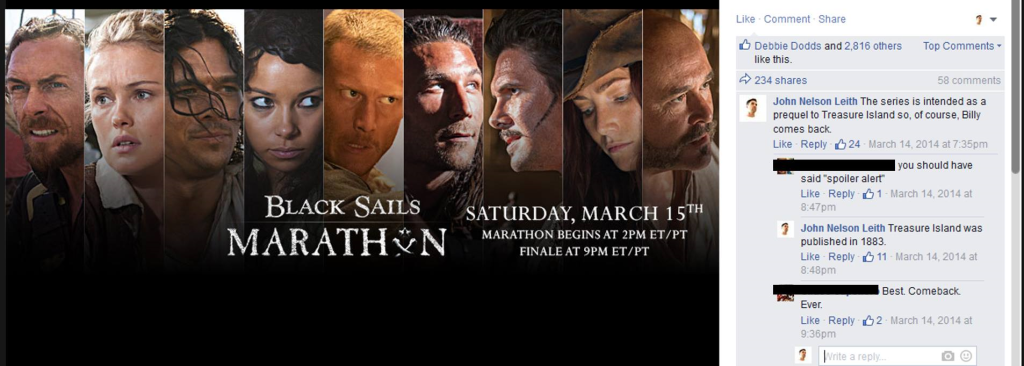 So, I was recently shamed in an internet comment feed (no surprise there) for not posting “spoiler alert” before suggesting that the character Billy Bones probably didn’t really die in the first season of the Starz series Black Sails, because the show is conceived as a prequel to Robert Louis Stevenson’s Treasure Island, in which Billy Bones plays a significant role.
So, I was recently shamed in an internet comment feed (no surprise there) for not posting “spoiler alert” before suggesting that the character Billy Bones probably didn’t really die in the first season of the Starz series Black Sails, because the show is conceived as a prequel to Robert Louis Stevenson’s Treasure Island, in which Billy Bones plays a significant role.
The book was published in the 1880s, by the way. All of the people who read the first printing have lived their entire lives and are dead now.
Spoiler alert! The name of the cook on the show, John Silver, sounds familiar for a reason! (Yes, he’s the Long John Silver who started those seafood restaurants.)
This internet crusader wanted to pretend to care enough about the show to attack someone for revealing information, but didn’t care enough to know anything about the premise of the show. And, here’s the thing about trying to shame someone for revealing something that any real fan should know: it’s essentially a lazy, ignorant person’s attempt to make someone feel bad for being smarter than them and having the audacity not to keep their mouth shut.
And, you know what I think about trying to make people apologize for not being dumb and intellectually lazy? Fuck you. That’s what I think.
 Guess what else: the fact that the Urca de Lima was shipwrecked during a storm? I knew it before Flint’s crew did, because I do this thing called “learning about things that are real.” It’s the same weird personality trait that keeps me interested to see what happens on Downton Abbey as the brownshirts in Germany start doing more than just beating up the ex-pat fathers of high-born bastards.
Guess what else: the fact that the Urca de Lima was shipwrecked during a storm? I knew it before Flint’s crew did, because I do this thing called “learning about things that are real.” It’s the same weird personality trait that keeps me interested to see what happens on Downton Abbey as the brownshirts in Germany start doing more than just beating up the ex-pat fathers of high-born bastards.
Being surprised by knowable details like the rise of Nazism, or the wreck of the Urca, or the sinking of the Titanic (What an asshole way to end a love story, James Cameron!) is not what’s important about these stories, and the writers of Black Sails clearly understand that. Sure, I knew Billy probably didn’t drown because I’d read Treasure Island, but that didn’t lessen the impact of Flint tossing him overboard or Gates losing faith in Flint over it. Sure, I knew the Urca de Lima would show up shipwrecked, but the way this discovery played out in the crew’s loyalty to Flint was what the story was about, not the event itself.
Merely having a historical incident on which to base a story is not enough for a serious writer. You have to relate that event to the people factor, the Great Why of human motivation, and—if you’re writing serious literature—relate it to the idea factor as well. (For an example, see “Using a Random Historical Detail to Build Your Story.”) The writers of Black Sails aren’t just sprinkling in gotcha! moments from history and literature for shits and giggles. They’re writing an emotionally and thematically complex tale around them.
And, if someone isn’t a serious enough viewer to peer this deep into the story, to be blunt I don’t give a damn if I “ruin” the story by revealing surface details anyone with a library card could know.
Despite how much space on the internet and bookstore shelves is devoted to how to be a decent fiction writer, what we really need in Western culture today is more emphasis on how to be a decent consumer of information and fiction. Thomas Foster’s book, How to Read Literature Like a Professor : A Lively and Entertaining Guide to Reading Between the Lines, is a good start. But, there’s a huge problem with our intellectual diet today, our news and entertainment, that’s essentially the same as the problem with our biological diet: people will swallow unhealthy portions of toxic garbage and poison themselves unless they have a strong awareness of the right way to consume and the discipline to make themselves do it.
Novelty is the artificial sugar of fiction, and its cloying sweetness drowns out healthful ingredients. “Spoiler alert!” isn’t the warning label we need when discussing fiction. “Shock value alert!” is the warning we need, because the surprise element in fiction is garbage.
Here’s the reality behind spoiler alert shaming: research shows that people actually enjoy stories better when they know the ending. In fact, the entire desperate scramble for novelty and surprise in art is a foolish, unhealthy, inhuman crusade that flies in the face of psychological reality.
Sure, it’s fun to watch your friends experience the penultimate episodes of Game of Thrones seasons one and three (Spoiler alert! Crazy shit happens!) but the story itself gives these endings away … if you’re paying attention. Ned’s execution of the deserter from the Night’s Watch—particularly how he emphasizes that the man who passes sentence should be the one who carries it out—tells you all you need to know about what’s going to happen when it’s his head on the chopping block. And, could they have dropped enough hints in season three about the song The Rains of Castamere and the story behind it? Once that tune (which you’d heard at least twice before) starts playing during the Red Wedding, you cannot possibly not know what is about to happen.
This is what is called “fore-shadowing” in good writing, and it helps build tension not because you don’t know something is going to happen, but because you do know. If someone doesn’t get this, they’re not a good reader or a good viewer. They’re not paying attention. They’re too busy chatting with couch-mates while the show is on, or not interested or informed enough to know who Billy Bones is. I do not feel sorry for these people. At all. Because the “spoiling” they’re so upset about is largely a result of their own laziness, willful ignorance, and unhealthy addiction to crude shock value.
And, here’s what really gets me about this no-spoiler-alerts attitude: like with all the geek chic and “I fucking love science!” enthusiasm today, people want to revel in the hipster coolness of knowledge without bothering to actually have any.* People want to call themselves science nerds without really understanding science, or call themselves fans, derived from “fanatics,” without really bothering to know much about the thing for which they claim so much devotion that they rage in righteous indignation when someone “spoils” it for them.
And, if you don’t care enough about a story to know what you’re talking about, why should anyone else care about how bad you feel because they do know what they’re talking about?
_
* Even the great Dalai Lama of Sciencism, Neil deGrasse Tyson, scraped the merest veneer of knowledge when chastising people about the etymology of “Happy Holidays.” Clue for the clueless: not only has the word “holiday” taken on a secular meaning since it last meant “holy day,” which is precisely why people use it to avoid stepping on sectarian toes, but the word “holy” can been etymologically traced back to Proto-Germanic and Proto-Indo-European roots that simply mean “whole, healthy.” Tyson either dishonestly cherry-picked his etymological depth for political profit, or he’s just as “under-informed” as the people he claims to be schooling.

urbandesiqueen
March 17, 2014 at 8:02 pm
lmao…this is awesome. I agree and to be honest, the ability to be spoiler-free is a myth. With shows being based on history, fairy tale remixes and reboots of superheroes, you can’t be in the drk.